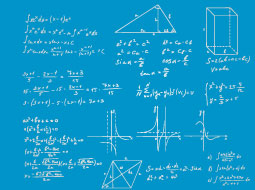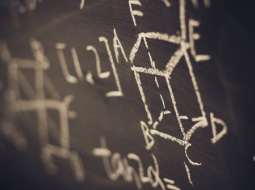Online courses directory (418)
This course analyzes combinatorial problems and methods for their solution. Topics include: enumeration, generating functions, recurrence relations, construction of bijections, introduction to graph theory, network algorithms, and extremal combinatorics.
This graduate-level course is a continuation of Mathematical Methods for Engineers I (18.085). Topics include numerical methods; initial-value problems; network flows; and optimization.
This course introduces students to iterative decoding algorithms and the codes to which they are applied, including Turbo Codes, Low-Density Parity-Check Codes, and Serially-Concatenated Codes. The course will begin with an introduction to the fundamental problems of Coding Theory and their mathematical formulations. This will be followed by a study of Belief Propagation--the probabilistic heuristic which underlies iterative decoding algorithms. Belief Propagation will then be applied to the decoding of Turbo, LDPC, and Serially-Concatenated codes. The technical portion of the course will conclude with a study of tools for explaining and predicting the behavior of iterative decoding algorithms, including EXIT charts and Density Evolution.
This course begins with an introduction to the theory of computability, then proceeds to a detailed study of its most illustrious result: Kurt Gödel's theorem that, for any system of true arithmetical statements we might propose as an axiomatic basis for proving truths of arithmetic, there will be some arithmetical statements that we can recognize as true even though they don't follow from the system of axioms. In my opinion, which is widely shared, this is the most important single result in the entire history of logic, important not only on its own right but for the many applications of the technique by which it's proved. We'll discuss some of these applications, among them: Church's theorem that there is no algorithm for deciding when a formula is valid in the predicate calculus; Tarski's theorem that the set of true sentence of a language isn't definable within that language; and Gödel's second incompleteness theorem, which says that no consistent system of axioms can prove its own consistency.
This course covers the mathematical techniques necessary for understanding of materials science and engineering topics such as energetics, materials structure and symmetry, materials response to applied fields, mechanics and physics of solids and soft materials. The class uses examples from the materials science and engineering core courses (3.012 and 3.014) to introduce mathematical concepts and materials-related problem solving skills. Topics include linear algebra and orthonormal basis, eigenvalues and eigenvectors, quadratic forms, tensor operations, symmetry operations, calculus of several variables, introduction to complex analysis, ordinary and partial differential equations, theory of distributions, and fourier analysis.
Users may find additional or updated materials at Professor Carter's 3.016 course Web site.
This course provides students with the basic analytical and computational tools of linear partial differential equations (PDEs) for practical applications in science engineering, including heat / diffusion, wave, and Poisson equations. Analytics emphasize the viewpoint of linear algebra and the analogy with finite matrix problems. Numerics focus on finite-difference and finite-element techniques to reduce PDEs to matrix problems. The Julia Language (a free, open-source environment) is introduced and used in homework for simple examples.
Lectures by P.B.Sunil Kumar, Department of Physics, IIT Madras
This course offers an advanced introduction to numerical linear algebra. Topics include direct and iterative methods for linear systems, eigenvalue decompositions and QR/SVD factorizations, stability and accuracy of numerical algorithms, the IEEE floating point standard, sparse and structured matrices, preconditioning, linear algebra software. Problem sets require some knowledge of MATLAB®.
This course will focus on various aspects of mirror symmetry. It is aimed at students who already have some basic knowledge in symplectic and complex geometry (18.966, or equivalent). The geometric concepts needed to formulate various mathematical versions of mirror symmetry will be introduced along the way, in variable levels of detail and rigor.
This course covers elementary discrete mathematics for computer science and engineering. It emphasizes mathematical definitions and proofs as well as applicable methods. Topics include formal logic notation, proof methods; induction, well-ordering; sets, relations; elementary graph theory; integer congruences; asymptotic notation and growth of functions; permutations and combinations, counting principles; discrete probability. Further selected topics may also be covered, such as recursive definition and structural induction; state machines and invariants; recurrences; generating functions.
This course is a student-presented seminar in combinatorics, graph theory, and discrete mathematics in general. Instruction and practice in written and oral communication is emphasized, with participants reading and presenting papers from recent mathematics literature and writing a final paper in a related topic.
In this course on the mathematics of infinite random matrices, students will learn about the tools such as the Stieltjes transform and Free Probability used to characterize infinite random matrices.
This is an advanced interdisciplinary introduction to applied parallel computing on modern supercomputers. It has a hands-on emphasis on understanding the realities and myths of what is possible on the world's fastest machines. We will make prominent use of the Julia Language, a free, open-source, high-performance dynamic programming language for technical computing.
Prepare for the College Mathematics CLEP Exam through Education Portal's brief video lessons on mathematics. This course covers topics ranging from real number systems to probability and statistics. You'll learn to use the midpoint and distance formulas, graph inequalities and multiply binomials. You'll also explore the properties of various shapes and learn to determine their area and perimeter. Our lessons are taught by professional educators with experience in mathematics. In addition to designing the videos in this course, these educators have developed written transcripts and self-assessment quizzes to round out your learning experience.
The goal of this course is to give an undergraduate-level introduction to representation theory (of groups, Lie algebras, and associative algebras). Representation theory is an area of mathematics which, roughly speaking, studies symmetry in linear spaces.
<p>This free online Geometry course provides a comprehensive introduction to geometrical methods and techniques, covering angles, triangles, quadrilaterals, polygons, and more. </p><br /> <p>It is ideal for complementing face-to-face classes, as a study guide, or for those who would like to refresh their knowledge of mathematics. </p>
The second part of our intermediate math course continues our free online maths suite of courses. It covers binomial, normal and hypergeometric distribution, discrete random variables, and integration. This course is ideal for students preparing for an exam, or for those wanting to refresh their knowledge of mathematics.
Analysis I (18.100) in its various versions covers fundamentals of mathematical analysis: continuity, differentiability, some form of the Riemann integral, sequences and series of numbers and functions, uniform convergence with applications to interchange of limit operations, some point-set topology, including some work in Euclidean n-space.
MIT students may choose to take one of three versions of 18.100: Option A (18.100A) chooses less abstract definitions and proofs, and gives applications where possible. Option B (18.100B) is more demanding and for students with more mathematical maturity; it places more emphasis from the beginning on point-set topology and n-space, whereas Option A is concerned primarily with analysis on the real line, saving for the last weeks work in 2-space (the plane) and its point-set topology. Option C (18.100C) is a 15-unit variant of Option B, with further instruction and practice in written and oral communication.
This course introduces topology, covering topics fundamental to modern analysis and geometry. It also deals with subjects like topological spaces and continuous functions, connectedness, compactness, separation axioms, and selected further topics such as function spaces, metrization theorems, embedding theorems and the fundamental group.
Trusted paper writing service WriteMyPaper.Today will write the papers of any difficulty.






















